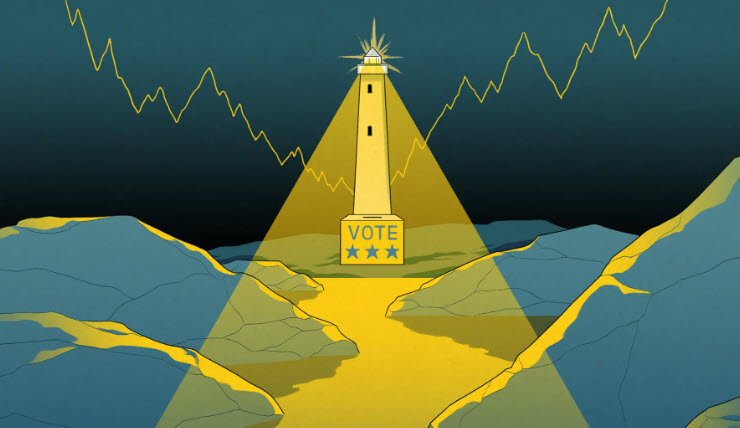By Jeff Sommer
Oct. 28, 2024
The stock market is soaring, yet there is plenty to worry about: bubbling conflicts and outright wars around the world and a close and contentious U.S. election.
At times like these, market history can be a source of comfort, at least up to a point.
Relying on history for wisdom about investing assumes that the future will resemble the past. That has been a good assumption in the United States for the past century or so. From 1926 through 2023, large U.S. stocks returned 10.3% annualized, according to Morningstar, the financial services company. The stock market generated those fabulous returns for anyone able to stick it out, despite turmoil and the declines associated with wars, recessions, depressions and extreme political conflict.

Anuj Shrestha
That history is essentially why I favor a time-tested strategy: buying a broad mix of stocks and bonds and holding on to them come what may, without allowing politics or world crises to intrude into my investment decisions.
Yet my central assumption — that this time won’t be different for the stock or bond market — could be incorrect. Every so often, there are major breaches with history when countries are devastated by economic collapse, war or extreme political change.
Partisans on both sides of the presidential election are warning that if the wrong candidate wins, this contest could set the United States on a dangerous path. This is a financial column, so I won’t evaluate the merits of those claims here: I’m merely acknowledging that grave concerns are in the air. And while I take these issues seriously, I’m enough of an optimist to believe that regardless of the winner, the markets and the economy will eventually trend upward.
But I could be wrong. And if you are drawn to the dire predictions, you may find my unruffled approach to investing unsatisfying.
So here’s a look at some research on what happened during extreme disasters — wars and depressions that led to market losses that stung for decades. There’s no shortage of miserable circumstances to consider.
War and Other Disasters
The best study I’ve read on the subject is “Wealth, War & Wisdom,” published in 2008 by Barton Biggs, a prominent hedge fund strategist, longtime Morgan Stanley executive and meticulous researcher. I discussed his work with him several times before his death in 2012. I find it riveting but disheartening, a brilliant discussion of dystopic financial outcomes that we all want to avoid.
Biggs examined the performance of stock and bond markets, and of alternative assets like gold, food, art and real estate, at times and in places of profound disaster. They included Germany and Japan in the first half of the 20th century and the years soon after World War II; France, Belgium and the Netherlands after Nazi Germany overran them; and the United States and Britain during the Great Depression.
It is grim stuff. And I find it painful to focus solely on finance when millions of people suffered and died. But for a moment, let’s try.
As Biggs noted, although the German stock market prospered for a while in the Nazi era, its cumulative inflation-adjusted return from 1900 through 1949 was minus 60%. Bonds were worse, with a total decline, after inflation, of 98%. The figures for Japan and France, which was battered in World War I and controlled by Germany in World War II, were also terrible.
In situations like these, Biggs said, squirreling away gold, diamonds, food, identity papers and weapons, and leaving the country, was better than investing in the local stock and bond markets (at least until the reconstruction of Europe and Japan after World War II led to a financial boom). In Nazi Germany, even if you were rich and well prepared, you needed luck to survive if you were Jewish, homosexual, Roma or a member of any other persecuted group.
After surveying a variety of disasters, Biggs found no panaceas. Once a country’s economic and political security unraveled, no single investment was always a winner.
But obscure country hideaways were often precious — lifesavers, if you reached them quickly enough. So he concluded that rich risk-averse moguls in the Eastern United States would be better off owning a well-stocked retreat in the Vermont hills than maintaining a gorgeous property nestled in the wilds of New Zealand.
Biggs’ audience was narrow: the truly wealthy. He didn’t write for people with modest resources.
His research was bleak, yet Biggs remained bullish on the U.S. stock market. Even during the worst of the financial crisis of 2008, he expected that stocks would eventually outperform other assets.
“As a congenital optimist, I believe in equities,” he once wrote. “Fundamentally, in the long run, you want to be an owner, not a lender. However, you always have to bear in mind that this time truly may be different.”
Lessons From the Farm
Stocks, bonds and cash (including money-market funds and government-insured savings accounts) are all I think most of us need in our portfolios most of the time. But hedges are available for people seeking protection against specific, known risks.
Farmers, for example, have always known that disaster can be just one bad harvest away. When a good crop means survival and a bad one can wipe you out, it makes sense to hedge — by buying futures contracts that will ease the pain if your own crop is disappointing.
Such classic hedges, which are the foundation of modern commodities markets, have a cost — and not just in the expenses involved in buying the contract. You are essentially betting against yourself, diminishing your profits in exchange for insurance against risk.
With contemporary markets, it’s possible to hedge against almost any current financial risk, like the possibility of another burst of fierce inflation or an abrupt expansion of the federal debt. For inflation, you might want to try Treasury Inflation-Protected Securities, or TIPS. For the debt, there is a market in credit default swaps, which price the likelihood that a sovereign nation like the United States will be unable to pay its obligations.
Assessing the severity of the danger you may be facing, and balancing that risk against the cost of your hedge, is an art form that I study but don’t routinely practice.
Nor have I ever bet on the outcome of an election through a prediction market. You can use such markets to hedge directly against election risk. Kalshi, for instance, is now taking such bets legally in the United States. There is also Polymarket, which accepts only cryptocurrency. Polymarket and many other offshore betting markets are restricted, in theory at least, to people who don’t live in this country.
In a prediction market, you needn’t bet on the person you want to win or believe will win. If you’re hedging against what you see as a grave danger, you can put your money down on the person you don’t want to win. That way, even if the election result seems to you to be a catastrophe, you will be compensated for what you see as the nation’s loss.
Then again, if the sky doesn’t fall, you will have wasted your money. It might be better just to focus on trying to help the better candidate win.
The Great U.S. Experiment
Hedging and prediction markets are certainly worth knowing about, but for financial well-being, I believe that straightforward strategies are superior for most of us — as long as the great U.S. experiment endures.
I’m keeping the faith and assuming that history will unfold on the mainly lucky course it has taken for so long. I don’t own gold bullion, a bombproof hideaway or a shotgun, and I’m not trading contracts on election prediction markets.
For peace of mind, I keep my own home stocked with food, coffee and wine. And as the election approaches, I’m investing for the distant future.
My portfolio is filled with low-cost index funds containing a cornucopia of stocks and bonds, including plenty of U.S. Treasurys. I expect them to remain the primary financial “safe haven” for the world.
c.2025 The New York Times Company


